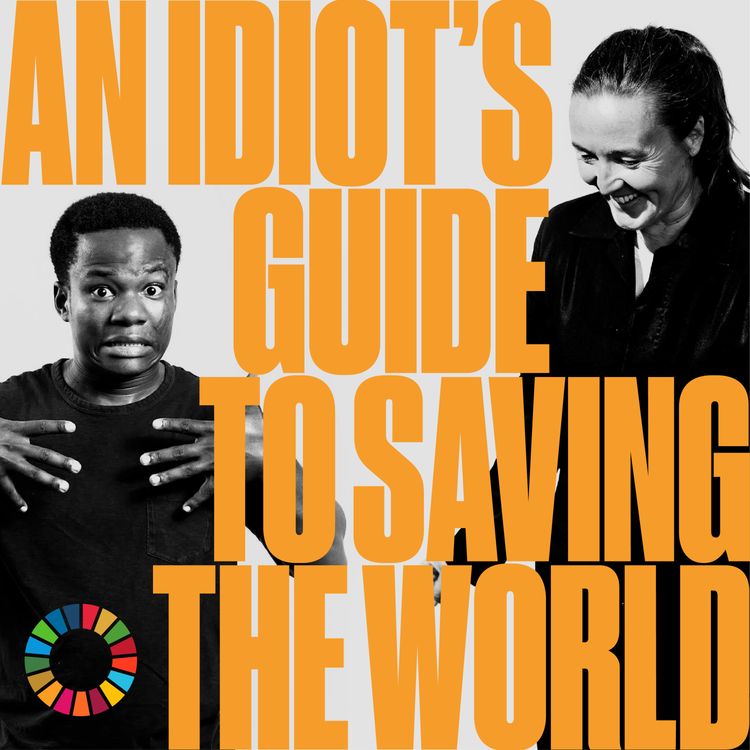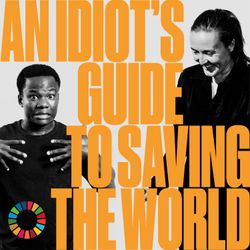Share

An Idiot's Guide to Saving the World
Nurturing Nature
Protecting life on land means protecting ourselves. Natural ecosystems are the best technology to help feed populations, cool the planet, provide fresh water and clean the air we breathe. But our biodiversity is under severe threat. Globally, over 1.2 million plant and animal species are predicted to face extinction in the coming decades. Experts now believe we’re in the midst of a ‘sixth mass extinction’, the first in Earth’s history to be driven primarily by human activity.
In this episode Gail and Loyiso ponder the wonderful services nature provides and take a closer look at the Global Goal to protect life on land (Goal 15). They ask renowned conservationist Gerardo Ceballos, who is credited with spearheading the first Endangered Species Act of Mexico, how we can halt the loss of biodiversity, and hear from indigenous activist Archana Soreng, why it all starts with considering ourselves as being part of nature itself.
Guests:
Gerardo Ceballos, Ecologist and conservationist, Professor at the University of Mexico and co-founder of Creatures United.
Archana Soreng, Indigenous climate activist and Member of the United Nations Secretary General's Youth Advisory Group.
For more:
More episodes
View all episodes

3. An Idiot’s Guide to Using Collective Power for Change
33:05||Season 3, Ep. 3Whether you are the head of a global corporation or a non-profit, everyone has a role to play in driving action that benefits the planet. And as customers we have the power and responsibility to put our money with the businesses that are fighting for that action.In the final episode of this bonus halftime series, Loyiso Madinga and Gail Gallie meet two leaders who are striving for sustainable outcomes in very different ways. Jesper Brodin is CEO of the Ingka Group, owners of IKEA. He has set his own goal for 2030: to reduce IKEA’s carbon footprint by 50%. Jesper tells us how he keeps climate concerns at the heart of his decision-making while running a very successful company, and why other businesses need to evolve too.Gloria Walton is CEO and president of the Solutions Project, which amplifies and funds climate justice solutions created by frontline communities to take control of their own futures. She tells us why giving power to these communities is key to creating meaningful change in the second half.
2. An Idiot’s Guide to Shaping a Better World Through Sport
39:44||Season 3, Ep. 2As we blow the halftime whistle we look to the sports world for some bright ideas in succeeding in the second half. Sport is an enormous industry with huge power, so how can we harness that to keep us moving towards our 2030 goal?In this episode Gail Gaillie and Loyiso Madinga meet Olympic sailor Hannah Mills, who has become an advocate for sustainability and clean oceans. She tells us how technological innovation in sport is being applied to other industries to create greener solutions. They also speak to the daughter of footballing legend Pelé, Kely Nascimento, a filmmaker and activist who works at the intersection of sport and social justice. Kely discusses how sport is a lens through which you can view any issues in society, and the investment still needed to develop women’s sport.
1. An Idiot's Guide to Bold Leadership in Unexpected Spaces
43:40||Season 3, Ep. 1We are officially halfway to the deadline of the Global Goals - 17 goals the world promised to deliver by 2030 - but we are not halfway to achieving them. In this bonus mini-series of ‘An Idiot’s Guide to Saving The World’ we take a half-time assessment of where we need to get to and how we are going to do it. Gail Gallie and Loyiso Madinga are joined by politicians, filmmakers, sports stars, activists and business leaders to give some ideas on what we can do to bring fresh energy to the second half. In this episode former President of Ireland, Mary Robinson teaches us a thing or two about communicating with people who might not share our values, and tells us why the future lies with women in leadership. And over in the USA, Chi Ossé - the youngest member of the New York City Council - is an advocate for the importance of getting people involved in local politics, and says that if you think something needs changing you might be the person to get it done.
9. LIVE from Stockholm Climate Week - Bonus Episode
55:16||Season 2, Ep. 9In a bonus live episode recorded at Stockholm Climate Week, Gail, Loyiso, and their guests examined how value-based innovation, supported by the 17 Global Goals, can unlock exponential solutions for both people and the planet. They explored how such innovation can help accelerate the necessary systemic changes to address the climate crisis. The episode featured a range of guests, including Sarah Hunter from the Advanced Research and Invention Agency, Bengt Rittri from the Bluewater Group, and Maya Rebermark from Future Earth who provided insights into system change and climate innovation from a climate policy perspective. Michael Smith from Regeneration VC, Sian Sutherland from PlasticFree, Dominique Souris, a social entrepreneur and climate activist, and Frances Simpson-Allen from Ebb Carbon then discussed how design and product-led innovation can drive climate action and facilitate scaling of impact towards system change.
8. Let’s come together so we don’t fall apart
46:40||Season 2, Ep. 8In the final episode of this season, Gail and Loyiso look at Goal 17, Partnerships for the Goals. They ask what the ingredients are of a good partnership and find out which sectors are working together to make a positive impact.They are joined by two SDG ambassadors who have been campaigning for the Goals since their inception. Dr Alaa Murabit and filmmaker and campaigner, Richard Curtis bring their wealth of experience to the table and share some encouraging examples of successful collaborations. Alaa highlights the importance of seeing who holds power in the room, and Richard shares why he's optimistic that the match could be won in the second half.Guests:Alaa Murabit, Medical doctor, UN High-Level Commissioner on Health, Employment, and Economic Growth, and Director of Global Programs, Advocacy, and Communications at the Gates Foundation.Richard Curtis, Writer, director, campaigner and co-founder of Comic Relief and Project Everyone. For more:https://www.globalgoals.org/
7. We need to talk about Money
46:04||Season 2, Ep. 7The fight to eradicate extreme poverty has been fought for years. But despite this, over 700 million people still survive on less than $2.15 a day. So is it time we talk about cash? In this episode Gail and Loyiso dive deep into the Global Goal to end poverty (Goal 1). They are joined by two of the most exciting speakers in this field. Rory Stewart is the President of GiveDirectly, a fast growing nonprofit that is revolutionising the aid sector by allowing donors to send money directly to those in need, with no strings attached. Rutger Bregman is a historian and bestselling author and has been at the forefront of an equally simple, evidence-based solution: Universal Basic Income. Guests:Rory Stewart, President of GiveDirectly, host of 'The Rest is Politics', former politician and diplomat. Rutger Bregman, Historian and author of New York Times Bestsellers 'Humankind' and 'Utopia for Realists'. For more:https://www.globalgoals.org/
5. Why Mental Health matters
40:46||Season 2, Ep. 5The pandemic severely disrupted health services and derailed progress towards ending HIV, tuberculosis and malaria. It also triggered an increase in the prevalence of anxiety and depression, contributing to an already growing mental health crisis. 1 in 5 adults experience mental illness every year, and nearly half of all adults will experience it at some point in their lives. In this episode, Gail and Loyiso dive deep into the often-overlooked topic of mental health when discussing the Global Goal to good health and well-being (Goal 3). They speak with Will Poulter and Alex Holmes about their anti-bullying campaign and what might be contributing to skyrocketing rates of anxiety in young people and men, and they are joined by Sutton King to learn about mental health issues in urban indigenous communities and how plant medicines or psychedelics can offer a potential solution, as long as we learn from past mistakes.Guests:Will Poulter, BAFTA award-winning actor and Anti-Bullying Ambassador for the Diana Award.Alex Holmes, Founder of the Anti Bullying Ambassadors programme and Deputy CEO of The Diana Award. Sutton King, Indigenous rights activist, co-founder and President of the Urban Indigenous Collective, and Program Manager of Engagement at the Indigenous Medicine Conservation Fund For more:https://www.globalgoals.org/
4. How do we design a better world?
37:30||Season 2, Ep. 4Our cities are inherently unequal by design. They were often designed by tall, white, able bodied men. So what have they overlooked? Can we reduce inequality by designing a better world? In this episode Gail and Loyiso explore the Global Goal to reduce inequality (Goal 5) and are joined by famous youtuber Molly Burke, who happens to be blind and has a load of helpful tips for designing better accessibility offline and online. And architect turned big thinker Indy Johar calls for a fundamental overhaul of an old system that perpetuates inequalities in all its forms. Guests:Molly Burke, Speaker, Digital Creator, Author, and Advocate. Indy Johar, Architect, co-founder of project00 and Dark Matter Labs.For more information go to www.globalgoals.org